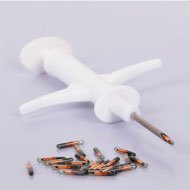
New law will come into force in April 2016
Compulsory dog microchipping will be introduced in Scotland from April 2016, at the same time as similar legislation comes into effect in England and Wales.
The news was announced on March 4 by Scotland's rural affairs secretary Richard Lochhead. "I can now confirm that compulsory microchipping will be introduced in Scotland next year, after it was overwhelmingly backed in our public consultation," he said in a statement.
"This will be a huge help in reducing the number of lost and abandoned dogs in Scotland."
According to Mr Lochhead, around two thirds of dogs in Scotland have already been microchipped and last year, more than 10,000 dogs were reunited with their owners thanks to their microchips.
"This is an impressive figure, but it could be improved on dramatically by ensuring that all dogs are microchipped, and, equally important, that their details are kept up to date," he added.
Welcoming the news, BVA president John Blackwell said: "It will help ensure that lost dogs can be reunited with their owners, which is a positive outcome that will affect many thousands each year.
"With a deadline set for introduction, the Scottish Government now has the time to work out the details of implementation before microchipping becomes compulsory – for example, it is essential that it is clear who can and cannot implant microchips."
Mr Blackwell said the BVA and its Scottish branch will work with the government over the next 12 months to ensure vets and their clients understand their responsibilities and are prepared for these new rules.



 RCVS Knowledge has called on vet practices to audit their post-operative neutering outcomes.
RCVS Knowledge has called on vet practices to audit their post-operative neutering outcomes.